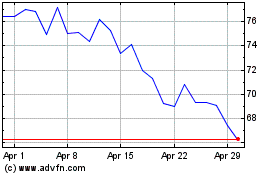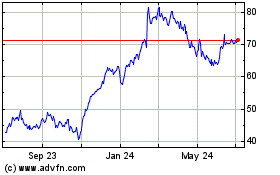Shares of Casper Sleep Rise 13% on First Trading Day -- WSJ
February 07 2020 - 3:02AM
Dow Jones News
By Allison Prang
This article is being republished as part of our daily
reproduction of WSJ.com articles that also appeared in the U.S.
print edition of The Wall Street Journal (February 7, 2020).
Shares of Casper Sleep Inc. closed about 13% higher on their
first day of trading Thursday, a day after the mattress-seller
priced its IPO at the lower end of its expected price range.
Shares closed at $13.50 a share, higher than the company's
public offering price of $12 a share. The stock opened above its
IPO price Thursday at $14.50 a share and reached an intraday high
of $15.85 a share.
Those gains, however, were after the company cut its public
offering price. Casper's public offering price of $12 a share
Wednesday was well below its initial range of $17-to-$19 a share,
and at the low end of the $12-to-$13 a share range it set Wednesday
morning.
The company has a valuation of about $535 million, based on its
number of common shares outstanding before any options were
exercised by the offering underwriters and also on Thursday's
closing price. Casper had been valued at $1.1 billion in a private
funding round early last year.
Co-founder and Chief Executive Philip Krim declined to comment
specifically on the company's price cut in an interview with The
Wall Street Journal Thursday. Mr. Krim said he has watched the
turmoil in the IPO market, but it isn't something the company is
focused on.
"Today's a really exciting milestone," Mr. Krim said.
Casper, founded back in 2014, reported a larger loss for the
first nine months of 2019 versus the comparable period a year
prior, but revenue rose. The company's loss grew almost 5% to $67.4
million, while revenue rose 20% to $312.3 million.
Mr. Krim on Thursday said Casper is focused on profitability and
its operating leverage improved in 2019.
Casper, which sells foam mattresses online and delivers them
through the mail, went public during a touchy time for IPOs.
Investors have grown more tepid toward highly-valued startups that
burn through money, and some companies in 2019 nixed their plans to
go public, including the parent of WeWork, the coworking space
company, and Endeavor Group Holdings Inc., the owner of the Miss
Universe Pageant and the biggest talent agency in Hollywood.
Endeavor pulled its own IPO plans after shares of Peloton
Interactive Inc., the exercise-bike company, struggled on their
first day of trading on public markets. The stocks of ride-share
companies Uber Technologies Inc. and Lyft Inc., which both went
public last year, have also traded below the prices at which they
went public.
Casper was selling 8.35 million common shares in its IPO. The
company said it gave an option for underwriters to buy as many as
1.25 million shares for overallotments.
Write to Allison Prang at allison.prang@wsj.com
(END) Dow Jones Newswires
February 07, 2020 02:47 ET (07:47 GMT)
Copyright (c) 2020 Dow Jones & Company, Inc.
Uber Technologies (NYSE:UBER)
Historical Stock Chart
From Mar 2024 to Apr 2024

Uber Technologies (NYSE:UBER)
Historical Stock Chart
From Apr 2023 to Apr 2024
